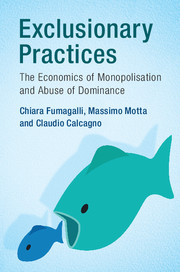1 - Predatory Pricing
Published online by Cambridge University Press: 05 January 2018
Summary
Introduction
Predatory pricing is one of the most interesting and most controversial issues in antitrust. The term refers to a practice whereby an incumbent firm (the predator) sets prices very aggressively with the aim of excluding a rival from the market (that is, forcing the rival to leave the market or discouraging it from entering) or marginalising the rival and relegating it to a niche role. Predation – if successful – will therefore be associated with the existence of two periods: one, the predatory period, in which consumers will enjoy low prices and the incumbent will sacrifice profits; the other, the recoupment period, in which the incumbent will be able to increase its prices, and obtain higher profits, because the prey is no longer in the market (or has been marginalised). From the incumbent's point of view, this strategy is profitable if the earlier profit sacrifice is outweighed by the subsequent higher gains. From the point of view of consumers, and of social welfare, exactly the opposite happens. If the predatory strategy is successful, higher surplus during the predatory period will be outweighed by lower surplus in the recoupment phase.
Given that predatory episodes are associated with low prices, it should not come as a surprise that it is extremely difficult to distinguish low prices that are an expression of tough but fair competition from low prices that are an expression of an exclusionary strategy by the dominant firm. Suppose we observe that after the entry of a competitor, an incumbent firm reacts by starting to cut prices aggressively. Is this the sort of genuine competitive response that we should expect (after all, any theory in which firms do not collude would foresee that entry would lower equilibrium prices), or is it instead predation? In other words, are low prices good news for consumer welfare, or are they instead just a temporary consumer gain which anticipates the permanent consumer loss which will take place when the prey exits the market? This is the first reason why predation is a controversial issue. A second reason is that, until the 1980s, economists had been unable to propose a convincing rationale for predation.
- Type
- Chapter
- Information
- Exclusionary PracticesThe Economics of Monopolisation and Abuse of Dominance, pp. 14 - 125Publisher: Cambridge University PressPrint publication year: 2018

